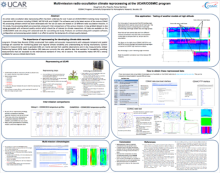Multi-mission radio occultation climate reprocessing at the UCAR/COSMIC program
Doug
Hunt
UCAR/COSMIC
Poster
Long-term Climate Data Records (CDRs) constructed from stable and accurate measurements with adequate temporal and spatial coverage are essential for monitoring global and regional climate variability and understanding its forcing mechanisms. Current long-term measurements used to generate CDRs are mainly derived from satellite observations and in situ measurements. Global Positioning System (GPS) Radio Occultation (RO) data are currently the only satellite data that maintain SI traceability, providing measurements that are traceable to the international standard of time, the SI second. This traceability makes GPS RO a strong candidate for use as a climate benchmark.
An active radio occultation data reprocessing effort has been underway for over 5 years at UCAR/COSMIC involving many important international RO missions including COSMIC, METOP-A/B, and CHAMP. The software used is the latest version of the mature CDAAC RO processing software which has been developed over the last 23 years and tested on 10 different radio occultation missions. In this study, the processing details are presented, along with inter- comparisons of the various missions. A new gridded dataset is also being generated with enhanced quality control which should be of interest to climate researchers. All data are available on the UCAR/COSMIC web site along with advanced tools for sub-setting and study. Products are archived along with complete software, configuration and processing system details in an effort to satisfy the demands of a climate-quality dataset.
An active radio occultation data reprocessing effort has been underway for over 5 years at UCAR/COSMIC involving many important international RO missions including COSMIC, METOP-A/B, and CHAMP. The software used is the latest version of the mature CDAAC RO processing software which has been developed over the last 23 years and tested on 10 different radio occultation missions. In this study, the processing details are presented, along with inter- comparisons of the various missions. A new gridded dataset is also being generated with enhanced quality control which should be of interest to climate researchers. All data are available on the UCAR/COSMIC web site along with advanced tools for sub-setting and study. Products are archived along with complete software, configuration and processing system details in an effort to satisfy the demands of a climate-quality dataset.

Abstract file
Abstract file